高级搜索
当前的位置:
全部图书课程
瀑布式
|
列表式

电力系统分析(第2版)
本书包括电力系统稳态分析(第1~5章)、电力系统暂态分析(第6~8章)和电力系统稳定与控制(第9~11章)共三部分内容。主要讲述: 电力系统各元件的参数和等值电路、潮流计算、有功功率平衡和频率调整、无功功率平衡及电压调整、短路的基本概念及计算方法、对称分量法、各序网络的制定、简单不对称短路计算、电力系统静态稳定性及动态稳定性的基本概念及其分析方法。
本书可作为高等学校电气工程及其自动化等相关专业的教学用书,亦可供电力系统相关专业的技术人员参考。
¥34.29
图书
电子书

电路(下册)
本书根据教育部高等院校电子信息类专业的“电路分析教学基本要求”编写而成。全书分为上、下两册,共17章。其中上册包括第1章~第9章,主要内容包括电路模型和电路定律,电阻电路的等效变换,电阻电路的一般分析方法,电路定理,含运算放大器的电阻电路分析,一阶电路分析,二阶电路分析,相量法,正弦稳态电路的分析。下册包括第10章~第17章,主要内容有含有耦合电感的电路,三相电路,非正弦周期电流电路,线性电路的运算法分析,网络函数,电路方程的矩阵形式,二端口网络,非线性电路等。各章例题、习题难易适中,便于学生自学和教师施教。本书面向全国各类高等院校,可作为自动化、仪器仪表、电子信息工程、通信工程、电气工程及其自动化、 计算机科学与技术、电子科学与技术等专业的教材,也可供有关科技人员参考。
¥14.30
图书
电子书
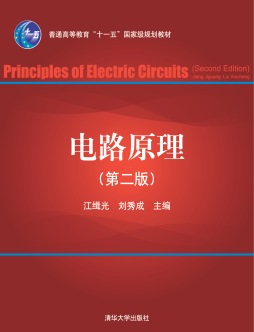
电路原理(第2版)
本书是《电路原理》(江辑光主编,清华大学出版社,1996)的修订版,内容符合教育部高等学校电子信息与信息学科教学指导委员会基础课程教学指导分委员会2004年颁布的“电路理论基础”和“电路分析基础”的教学基本要求。全书共分20章,包括电路元件和电路定律、简单电阻电路的分析方法、线性电阻电路的一般分析方法、电路定理、含运算放大器的电路、电路的频率特性、三相电路、周期性激励下电路的稳态响应、傅里叶变换和拉普拉斯变换、二端口(网络)、网络图论基础、状态变量法、非线性电路简介和分布参数电路。另有磁路和含铁芯的线圈、复数复习、PSpice电路仿真简介和电路原理中英文专业词汇对照表四个附录。本书末附有大部分习题和参考答案。本书可作为电子与电气信息类专业电路课程的教材使用,也可供有关科技人员参考。
¥29.25
图书
电子书
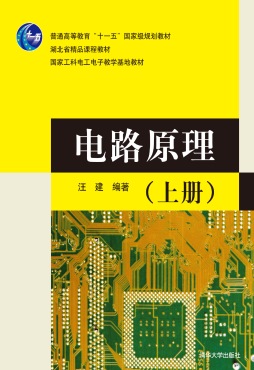
电路原理(上册)
本书系统地介绍了电路理论的基本概念、基本原理和基本分析方法。全书共分上下两册15章。上册内容包括: 电路的基本定律和电路元件; 电路分析方法——等效变换法、电路方程法、运用电路定理法; 正弦稳态分析; 谐振电路与互感耦合电路。下册内容包括: 三相电路; 非正弦周期性稳态电路分析; 双口网络; 暂态分析方法——经典分析法、复频域分析法、状态变量分析法; 均匀传输线的稳态分析和暂态分析; 非线性电路分析概论。 从培养学生分析、解决电路问题的能力出发,通过对电路理论课程中重点、难点及解题方法的详细论述,本书将基
¥22.10
图书
电子书

电路电子技术实验及设计教程
本书是电路电子技术实验及设计教材,内容包括实验概论、电路技术(包括信号与系统)实验、模拟电子技术(包括高频、低频)实验、数字电子技术实验、电工技术实验、附录六篇。涵盖了验证实验、综合实验及设计实验(基础设计、综合设计),附录提供了有关实验的部分资料。同时为大部分实验安排了基础设计实验内容,给出了具体的设计方法及参考电路,以培养学生的创新思维及能力。本书不仅可以作为高等院校本科电类、非电类专业的实验教材,亦可作为高专及成人教育的相关专业教材,也可供从事电气信息类实验、电子设计和研制的工程技术人员参考。
¥25.35
图书
电子书
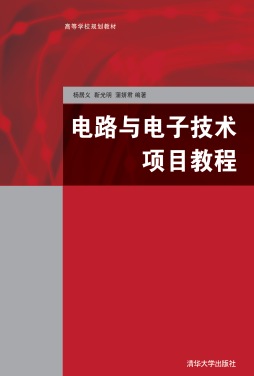
电路与电子技术项目教程
本书根据高等教育人才培养的指导思想,严格按照高等院校教学大纲编写而成。全书共分12个模块,包括电路基本概念和基本定律分析与测试、电路的基本分析方法与测试、交流电路分析与测试、电路的过渡过程分析与测试、半导体器件分析与测试、基本放大电路分析与测试、集成运算放大器分析与测试、直流稳压电路分析与测试、数字电路基础与测试、组合逻辑电路与测试、时序逻辑电路与测试和课程设计等知识。
本书将精缩的理论知识、实践教学和项目训练相结合,可以作为高等院校、高校、高职院校计算机、机电、自动化、电子信息、计算机科学与技术、仪器仪表、通信工程、物联网专业的电路与电子技术、计算机电子技术课程的教材。同时也可供科技人员学习参考。
¥37.70
图书
电子书

电路基础
“电路”课程是自动化、电子信息工程等电气类专业的一门重要的专业基础课。它的任务是通过本课程的学习,掌握电路的基本理论、电路分析的基本方法和进行实验的初步技能,为后续的课程准备必要的电路知识。本书共分14章,主要内容有:电路模型及电路定律、电阻电路的等效变换、电阻电路的一般分析方法、电路定理、相量法基础、正弦交流电路的分析、耦合电感与理想变压器、频率响应及信号的频谱、二端口网络、线性动态电路的时域分析、线性动态电路的复频域分析、网络函数、大规模电路分析方法基础、非线性电阻电路。本书可供高等学校电子与电气信息类专业师生作为电路课程的教材使用,也可供有关科技人员参考。
¥25.35
图书
电子书

电路理论与实践
全书内容共三篇,第1篇为电路理论部分,分为13章,主要介绍直流电路、交流电路、动态电路等的分析方法,以及分布参数电路分析;第2篇为电路仿真实验,主要介绍仿真软件Multisim的应用;第3篇为电路实验指导,介绍了30个常用的电路实验,分为验证性实验、研究性实验和设计性实验3个类型。书中每章都有小结,并配有大量例题和习题,有助于更好地理解和掌握相关内容。本书适合高等学校电类(强、弱电)及相关专业师生使用,也可供有兴趣的读者自学使用。
¥25.35
图书
电子书
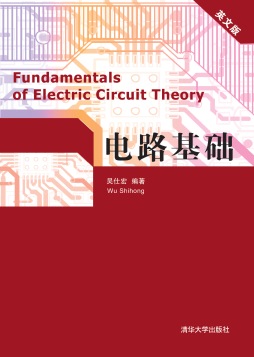
Fundamentals of Electric Circuit Theory(电路基础)
The book is designed for use as a textbook for a first course in circuit analysis or as a supplement to standard texts and can be used by electrical engineering students as well as other engineering and technology students. Emphasis is placed on the basic laws, theorems, and problem-solving techniques which are common to most courses. The book begins with fundamental definitions, circuit elements including dependent sources, circuit laws and theorems, and analysis techniques such as node voltage and mesh current methods. These theorems and methods are initially applied to DC-resistive circuits and then extended to RLC circuits by the use of impedance and complex frequency. Chapter 3, where the concept of complex frequency is introduced, phasor analysis, sinusoidal steady state, power, power factor, and its correction.. Series resonance, quality Factor, Q, power, bandwidth, and selectivity of a series resonant circuit, coupled circuits and transformers are thoroughly covered in Chapter4.The characteristics of three-phase circuits, the analysis of balanced loads and unbalanced Loads, the calculation and measurement of power in three-phase circuits are mainly introduced in the last chapter. It can be used as a primary text or supplementary text. It is also ideal for self-study and provides the technical staffs and university teachers with references.
¥25.87
图书
电子书
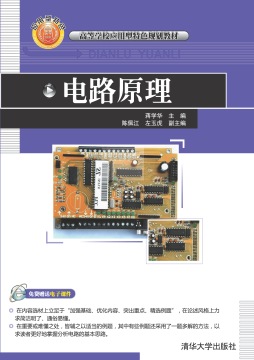
电路原理
本书以现代电工技术的基本知识、基本理论为主线,以培养应用能力为目的,较为系统地介绍了电路的基本概念、基本理论和分析方法。全书共12章,各章的主要内容包括电路的基本概念与定律、电阻电路的等效变换、电路分析的基本方法、电路的基本定理、电容与电感、动态电路的时域分析、正弦稳态交流电路、三相电路、耦合电感电路、动态电路的复频域分析、双口网络、非线性电阻电路等。本书适于作为普通高等院校电气、电子、自动化、通信、计算机、自控等相关专业的教科书,也可作为成人教育和继续教育的教材,还可供科技人员参考。
¥29.90
图书
电子书
加载更多
更多精彩专题




